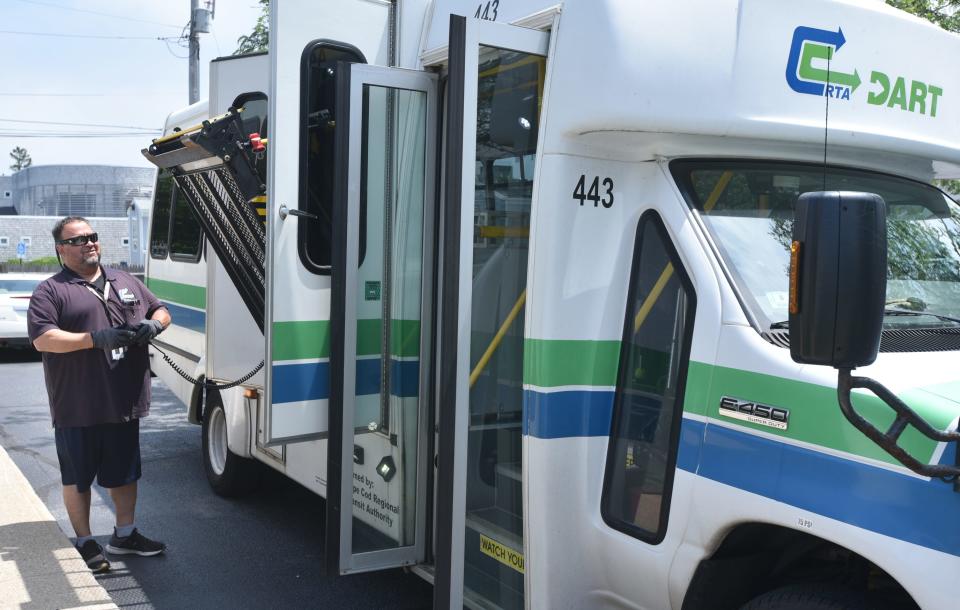Outer Cape towns little served with public dial-a-ride service, data shows
The dial-a-ride, or DART, service offered by the Cape Cod Regional Transit Authority is advertised as an affordable “door-to-door, ride by appointment” option for all residents and visitors across Cape Cod.
All 15 towns.
But newly analyzed transit authority data requested by the Times showed a sizable imbalance in which regions of the Cape are being served.
There were 63,052 total dial-a-ride trips recorded between January and June of this year, according to the data. But only 2.5% of the total number of rides — or 1,574 rides — came from the Outer Cape.

“DART really isn’t intended for extensively long trips,” said Chief Financial Officer for the Cape Cod Regional Transit Authority Henry Swiniarski. “You can imagine the costs of operating the DART, we’re running at a pretty large per-hour cost. The idea of taking one individual from the Outer Cape to Hyannis or Sandwich, that would be an extremely expensive thing.”
Both Swiniarski and Cape Cod Regional Transit Authority Deputy Administrator Kathleen Jensen said no requests for dial-a-ride service coming from the Outer Cape were denied in the last six months, but acknowledged limitations in Outer Cape dial-a-ride services.
The Outer Cape refers to the outermost towns such as Orleans, Eastham, Wellfleet, Truro and Provincetown, where a car ride to the middle part of the Cape, and to centralized medical offices and Cape Cod Hospital in Hyannis, could take 45-60 minutes.
Why do individuals on the Cape use a dial-a-ride service?
Community advocates, health care professionals, and public officials claim the dial-a-ride program is vital in order to provide an accessible form of public transportation for people who cannot otherwise utilize bus routes or other methods of transportation.
Most dial-a-ride ride requests came from Hyannis, Harwich, and Mashpee, and the largest category was for rides to and from work. work-related purposes. But the data showed a majority, about 20% of the total number of rides — or 12,264 — were for medical care, including dialysis, therapy, and senior care.
Of the 12,264 rides classified as a medical or dental appointment, only 145 came from the Outer Cape.
Suzanne Grout Thomas, director of community services for the town of Wellfleet, said working with the transit authority is critical to address the limited Outer Cape services of the dial-a-ride program.
In the data analyzed, Wellfleet had 105 dial-a-ride rides.
“I know that the CCRTA provides DART ride services for all 15 towns,” Thomas said. “However, because they are limited to providing service where the most requests are, demographics don't lend themselves to showing a justification for more service.”

The transit authority is one of 15 regional transit authorities within the state and has been providing public transportation services since 1976, according to the website.
Outermost towns on Cape are considered rural
The Outer Cape is classified as a rural area by the Massachusetts Rural Policy Advisory Commission, and has a regional population of around 17,410, which includes Provincetown, Truro, Wellfleet, Eastham, and Orleans, according to 2018 U.S. Census data — compared to 205,830 for the rest of the Cape.
In addition to the 105 ride requests in Wellfleet, Orleans had approximately 1,200 rides, Eastham had 175, and Provincetown had six. The data showed no rides for the town of Truro, the Cape's smallest town, with a population of about 2,000, according to 2018 U.S. Census data.
Public agency says expense is the biggest concern
Swiniarski said funding and budget restrictions are some primary limitations on Outer Cape dial-a-ride services .
“We need to live within the constraints of our budget,” he said. “But we have our efforts to take our budgetary dollars that are available to us to see where we can, in an efficient way, provide additional transportation services.”
Other alternatives to dial-a-ride for residents and visitors on the Outer Cape include FLEX bus routes and a Peter Pan motor coach line. The FLEX bus, also part of the transit authority, deviates, or flexes, off its route up to three-quarters of a mile to serve people who may have trouble getting to a designated bus stop.
FLEX routes include a Harwich to Provincetown line and vice versa, according to the transit authority’s riders guide for the summer. These routes run seven days a week and begin service between 4 a.m. and 5:30 a.m. depending on the day — FLEX routes end between 9:30 p.m. and 9:50 p.m., according to the guide.
After riders get off at the Harwich stop — if they are taking the FLEX from Provincetown — they would then take the H20 bus, another transit authority bus, into Hyannis.
The transit authority also began partnering with Peter Pan bus service in 2019, providing bus rides from Provincetown to the Hyannis Transportation Center three times a day — 8:45 a.m., 1:35 p.m., and 6:45 p.m.
The transit authority partnered with Peter Pan "to make sure that people in the Outer Cape area are able to get a more express run to some other health care facilities and hospitals,” Jensen said.
It's not easy to get on public transportation if you're feeling unwell
Brianne Smith, director of care management for Outer Cape Health Services — an organization that provides health care and social services to Cape residents and visitors, including arranging transportation to and from medical appointments — said it can be difficult for individuals suffering from medical conditions to use and get to public transportation services like bus routes.
“Often, somebody’s not feeling their best,” Smith said. “Trying to get somebody on a bus for a very long period of time, [you have to ask] can they ambulate well enough to be getting on and off and switching buses around?”
Ride-hailing services such as Uber and taxis are sometimes used when the dial-a-ride or other methods of transportation are unavailable, Smith said, which can cost a rider around $500 for a round-trip.
“It would be great to continue the conversation about how dial-a-ride might be able to be more accessible or utilized out this way,” Smith said, referring to the Outer Cape.
Budgetary concerns could soon change
State Sen. Susan Moran, D-Falmouth, said regional transit is “the grease behind the wheel” of several issues facing communities on the Cape and in the commonwealth — including housing, climate change initiatives, and workforce concerns.
Moran recently filed a bill that aims to increase regional transit accessibility in the state. She said the bill introduces an additional $100 million for regional transit funding and grants, bringing the total Senate budget to $194 million for regional transit authority funding — a figure that is double from last year.
“If you build it they will come,” Moran said of bolstering public transportation infrastructure. “If we provide funding for more frequency and availability of rides, then the ridership will realize the availability of the service.”
Walker Armstrong reports on all things transportation and the Joint Base Cape Cod military base. Contact him at WArmstrong@gannett.com. Follow him on Twitter: @jd__walker.
Thanks to our subscribers, who help make this coverage possible. If you are not a subscriber, please consider supporting quality local journalism with a Cape Cod Times subscription. Here are our subscription plans.
This article originally appeared on Cape Cod Times: Outer Cape dial-a-ride services lag behind: budget constraints cited

